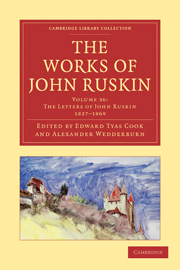Book contents
- Frontmatter
- Contents
- LIST OF ILLUSTRATIONS
- INTRODUCTION TO VOLUMES XXXVI. AND XXXVII
- THE LETTERS OF RUSKIN: 1827 TO 1869
- LIST OF THE CORRESPONDENTS TO WHOM THE LETTERS ARE ADDRESSED
- EARLY LETTERS, 1827–1843
- 1844
- 1845
- 1846
- 1847
- 1848
- 1849
- 1850
- 1851
- 1852
- 1853
- 1854
- 1855
- 1856
- 1857
- 1858
- 1859
- 1860
- 1861
- 1862
- 1863
- 1864
- 1865
- 1866
- 1867
- 1868
- 1869
- Plate section
1860
Published online by Cambridge University Press: 05 November 2011
- Frontmatter
- Contents
- LIST OF ILLUSTRATIONS
- INTRODUCTION TO VOLUMES XXXVI. AND XXXVII
- THE LETTERS OF RUSKIN: 1827 TO 1869
- LIST OF THE CORRESPONDENTS TO WHOM THE LETTERS ARE ADDRESSED
- EARLY LETTERS, 1827–1843
- 1844
- 1845
- 1846
- 1847
- 1848
- 1849
- 1850
- 1851
- 1852
- 1853
- 1854
- 1855
- 1856
- 1857
- 1858
- 1859
- 1860
- 1861
- 1862
- 1863
- 1864
- 1865
- 1866
- 1867
- 1868
- 1869
- Plate section
Summary
To Francis Turner Palgrave
[January 27, 1860.]
My dear Palgrave,—I was very glad to hear from you, though I cannot be of any use, having just given away my presentation. I shall not have another for five years.
Your account of Portugal is quite what I should have expected. I have never had the least curiosity to see either Portugal or Spain. You must have had a very pleasant tour, however, meeting Tennyson. Yes, Good art is—has been—will be rare, and I fear your anticipations respecting our English art are not likely to be fulfilled. The time has come, I hope, for comfort, peace, and science, but Art cannot coexist with Steam, or over much iron. The Delphian knew a little more than people think in his πημ επ πηματ κετα.
I am finishing Modern Painters now as fast as I can, and hope to get it done in three or four months.—Believe me most truly yours,
J. Ruskin.
I think you will ultimately find my statement in The Two Paths a tolerably true one, that there never have been any great schools of art save three—Athenian, Florentine, Venetian.
To Miss E. F. Strong
[London, March 3rd, 1860.]
Dear Miss Strong,—You may do things out of your head purely to amuse yourself—but always look upon them as one of the completest ways of wasting time.
Nothing can be starker nonsense than the idea of practice being needed for invention. All practice destroys invention by substituting Habit for it. Invention comes of materials first—and Heart and intellect afterwards.
- Type
- Chapter
- Information
- The Works of John Ruskin , pp. 332 - 353Publisher: Cambridge University PressPrint publication year: 2010First published in: 1909



